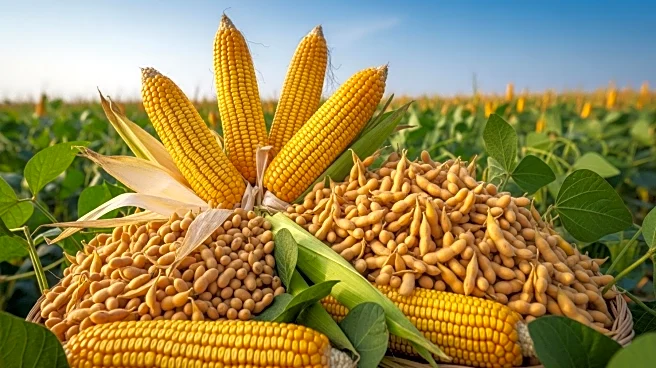What is the story about?
What's Happening?
Conab, the Brazilian government agency responsible for agricultural statistics, has released its 12th evaluation of the 2024/25 crop season, revealing increased estimates for both soybean and corn production. The soybean estimate has been raised by 1.8 million tons to a total of 171.4 million tons, while the corn estimate has increased by 2.7 million tons to 139.7 million tons. This growth is attributed to expanded soybean acreage and record yields, with the nationwide yield reaching 3,621 kg/ha, a 10.3% increase from the previous year. The state of Goias recorded the highest yield at 4,183 kg/ha. The corn production is primarily driven by the safrinha crop, which represents 80.5% of Brazil's total corn output. Overall, Brazil's total grain production for 2024/25 is projected to reach 350.2 million tons, marking a 16.3% increase from the previous year.
Why It's Important?
The increased estimates for soybean and corn production in Brazil have significant implications for global agricultural markets. As one of the world's largest producers of these crops, Brazil's output can influence global supply and pricing. The record production levels may lead to lower prices, benefiting importers but potentially challenging domestic farmers who face increased competition. Additionally, the growth in production underscores Brazil's role as a key player in global agriculture, which could impact trade dynamics, especially with major importers like China and the United States. The expansion in acreage and yield improvements also highlight advancements in agricultural practices and technology in Brazil, which could serve as a model for other countries seeking to enhance their agricultural productivity.
What's Next?
With the increased production estimates, stakeholders in the agricultural sector will likely monitor market reactions and adjust their strategies accordingly. Exporters may seek to capitalize on the surplus by expanding into new markets or strengthening existing trade relationships. Meanwhile, domestic farmers might face pressure to innovate and improve efficiency to remain competitive. Additionally, the Brazilian government may continue to support agricultural advancements through policies and investments in technology and infrastructure. The global agricultural community will watch closely to see how Brazil's production levels influence international trade and pricing, potentially leading to shifts in market dynamics.
















